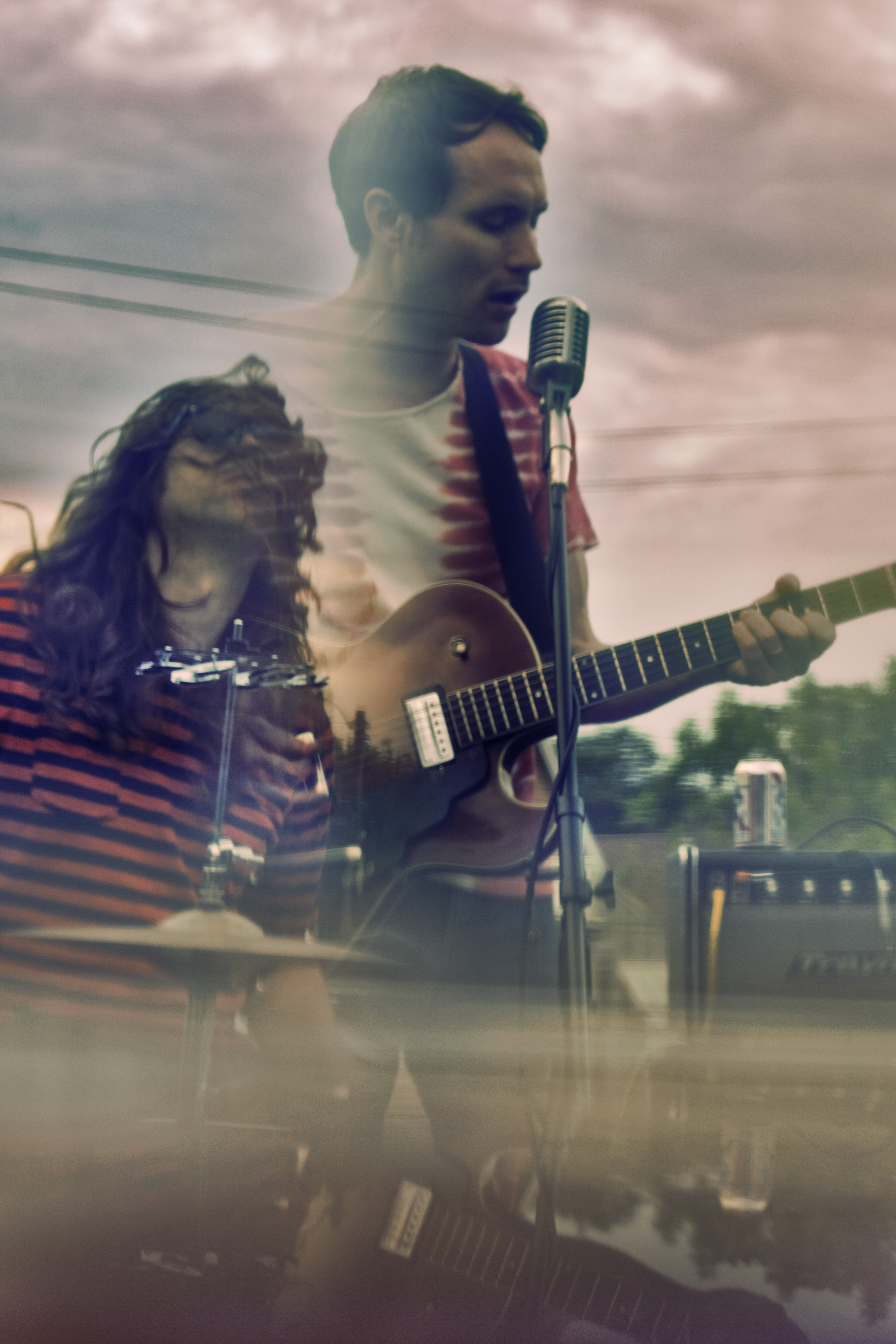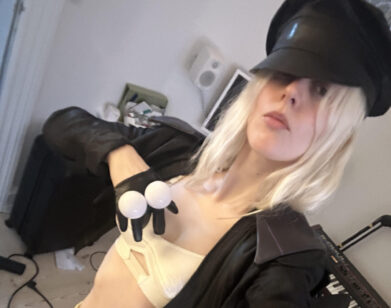Into Dust with Brian Borcherdt

ABOVE: (RIGHT TO LEFT) LEON TAHENY AND BRIAN BORCHERDT. PHOTO COURTESY OF JULIA SCHILL.
“You have a band named Holy Fuck, and sometimes you wonder if you’ve given people a first impression that maybe isn’t accurate,” Canadian musician Brian Borcherdt muses while on the phone with Interview.
Borcherdt, who is perhaps most famous as co-founder of the Canadian analogue electronic band Holy Fuck, is about to release his first LP as Dusted, a lo-fi indie duo consisting of Borcherdt and Leon Taheny. We are asking him about band names.
“[Dusted] is sort of a state of mind, I guess. A little bit of a self-deprecating state of mind; being a little bit done in or distracted… an idea of everything as coming through a veil; a cloud of dust or mist,” he continues.
An accurate description. If “Holy Fuck” does not immediately conjure up images of an indie Casio band, “Dusted” is much more in tune with the contemplative, filtering, and lingering sound of Brian’s new project.
Here we speak with Borcherdt just before Dusted’s debut album, Total Dust, is released about Dusted’s inaugural tour; transitioning from supporting act, to opening band, and back to supporting act; how he first got into music; and “maple leaf” friends.
EMMA BROWN: Hi, Brian. Where are you right now?
BRIAN BORCHERDT: We’re in LA. We’re getting ready to head out, but right now we’re someplace in Los Angeles.
BROWN: And you played a show last night?
BORCHERDT: Yeah, in San Diego.
BROWN: I know that this is your first tour with Leon as Dusted, have you guys established a performance pump-up ritual yet?
BORCHERDT: [laughs] Yeah, Leon and I, we’ve done South by Southwest, but really we haven’t been playing much, so last night was show number one of our first tour. We haven’t quite developed a ritual yet, but, if I’m lucky and I don’t have any overbearing responsibilities, I’ll probably have a glass of whisky. [Leon] winks at me a lot, it’s sort of his on-stage thing. It’s kind of a nice thing, you’ll look over at him, “Hey man,” like you’re doing this telepathic kind of communication that maybe the audience is not aware of, and he always responds with this totally friendly, fatherly wink. [laughs] And it’s good.
BROWN: That’s an important skill; I find it so hard to wink without it seeming really over-the top.
BORCHERDT: I look like a creep when I do it, but [with Leon] it’s like when Santa Claus winks in those old Coca-Cola commercials. [laughs] It’s a little magic.
BROWN: How did the first show go?
BORCHERDT: It was awesome. I think we went into it with a good attitude, it’s always nice to land in California, no matter what time of year, no matter where you’re coming from it’s just always a good feeling. So I think we went into it really in good spirits, and we’re friends with A Place to Bury Strangers because I’ve done a handful of tours with them before, so it’s kind of like a reunion of friends. I was actually surprised because we were playing first of three, which often means you’re going to be playing to an empty house, but it was actually quite full. The response was great; we had some CDs advance that we could sell, and people responded really well to it; we moved some units, as they say in the business, so it’s good.
BROWN: How do you judge whether people are responding well to your music—is it if they dance? Or stand still, mesmerized by the music?
BORCHERDT: [laughs] They rip off their shirts and they flex and go “RAHHHHH.” And they’ll fist-bump each other and then do this awkward kind of pec-bump. And they’ll whip their hats off and shoot at them in midair with pistols. We’re opening for two kind of Wall of Sound bands, This Will Destroy You and A Place to Bury Strangers, [and] I wasn’t sure if what we were doing would fall on deaf ears or. The fact alone that they seemed to like it and weren’t shrugging us off as being the total pussies of the tour; it was kind of a nice feeling.
BROWN: Is it weird going back to being the supporting act?
BORCHERDT: No, I’ve always taken a bit of pride in being a good opening band. With Holy Fuck, one of the things that I enjoyed the most was knowing that we were just kind of this weird and weirdly entertaining act, and we took a certain amount of pride in being a band that could go out on the road with a very diverse bunch of acts; we could open for Wolf Parade, and go open for M.I.A., and it was really fun for us. I think one of the more difficult transitions was becoming a headlining band, with all the big stage antics. There’s a comfort in going back to opening; there’s a lot less pressure, but also, it feels like you’re getting to crash someone else’s party, without having to be the host yourself. It’s also sometimes nice to know that you’re playing for an audience that maybe otherwise wouldn’t have heard you. It’s a new friendship that may have otherwise not happen.
BROWN: Have you ever opened for a band where the crowd just really wasn’t receptive?
BORCHERDT: [laughs] Actually, I mentioned, with Holy Fuck we’ve gone out with Wolf Parade. We did three tours with them, I think by the end we were doing pretty good, people started to like us—after three tours. But the first tour, they were very much the blogosphere “it” band, they had just finished their tour with Arcade Fire, all that shit was blowing up and Montreal was on everybody’s minds. When Wolf Parade came back to [Canada] for their big headlining tour and it brought a weirdo, Casio band, I think everybody just generally hated it. [laughs]
BROWN: What about when you opened for M.I.A.?
BORCHERDT: That was awesome. I think we had the advantage of opening her tour right before she had her breakthrough success with “Paper Planes.” She was already successful and a big name in my world, so that was perfect. The audience was generally a cool audience, generally people that were stoked and hadn’t been sullied with any kind of breakthrough to a more dubious realm of party-goers.
BROWN: What’s the nicest thing anyone’s ever said to you about your music?
BORCHERDT: [laughs] Oh my god, I don’t know. There’s always an interesting and slightly awkward interaction when people express something personal. Maybe I shouldn’t say awkward. It’s flattering, but when people go that extra distance to show you a tattoo they have… on their body, somewhere, that your music that has made happen… maybe I shouldn’t think of it this way, but my mind immediately goes to “Oh god, I hope they don’t regret that someday.” [laughs] I don’t want to be related to anyone’s regret in any way.
BROWN: A tattoo of lyrics?
BORCHERDT: No, a tattoo of album art—well, lyrics, I’m sure, are out there as well. Album artwork…
BROWN: Your face…
BORCHERDT: My face? No, luckily not my face. My face tattooed on their face? That’s a little weird.
BROWN: Yes, that would be very strange. Did you ever have an imaginary friend when you were little?
BORCHERDT: I called them “maple leaf” friends. I didn’t understand that people were saying “make believe,” I thought they were saying “maple leaf.” So I had maple leaf friends. Very Canadian, I think.
BROWN: If you could interview anyone, whom would you want to interview?
BORCHERDT: It depends on if I’m living in an alternate reality where a time machine is of use, or if I’m in this boring temporal universe of ours. But I don’t know. I guess living is a harder question. Maybe it’s easier to say someone from the past because there’s something intriguing about that. I’d like to go back in time and interview my grandfather who I never met, just because I feel like maybe I’d know more about myself.
BROWN: How do you decide disagreements now that you’re back in a two-person band? Coin toss?
BORCHERDT: Oh gosh, there should be a coin toss, shouldn’t there? I think that somehow I’ve reached a really good unspoken, democratic rapport with most people I play music with, including Leon. Ask us at the end of the tour. [laughs] A little winking contest… maybe not. [laughs]
BROWN: Can you raise your eyebrow?
BORCHERDT: Not really. I can do all kinds of fun things, but not that.
BROWN: What kind of fun things can you do?
BORCHERDT: Most of them are sound effects, but seeing as we barely know each other I won’t do any of my weird voices. But let’s just say I was a popular kid on the playground for nothing other than my ability to do comedic gestures and funny sounds. I was like that Police Academy guy who made all the sound effects.
BROWN: Have you ever auditioned for a play?
BORCHERDT: No, I grew up in a middle-of-nowhere fishing town, and we didn’t have plays. [laughs] We didn’t have anything. We had gym class. I didn’t really like that much.
BROWN: Hockey?
BORCHERDT: Yeah, hockey. When you get a little older and you’re getting to be a teenager and you want to express yourself, there wasn’t really that much in the way of the creative arts. We had hockey and other things I wasn’t interested in, but that’s what got me into music, so here I am.
BROWN: When did you first start playing music?
BORCHERDT: It would’ve been early teenage years. I idealized the image of the pastoral bard-like character, who goes into the woods with his lute and has bluebirds on his shoulder. That was really very much the ideal for me, and I was drawn to playing acoustic guitar because I wanted to be that guy, strolling through the woods in Nova Scotia with my guitar.
BROWN: Did you stroll through the woods of Nova Scotia with your guitar?
BORCHERDT: There are too many black flies, too many mosquitoes out there. It wasn’t until I got to the west coast that I realized you can go for a hike with a guitar. It was really quite liberating.
TOTAL DUST COMES OUT TUESDAY, JULY 10TH.






